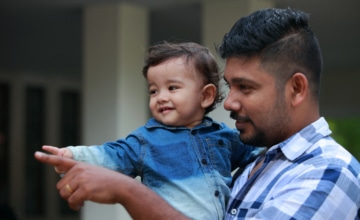Although it has already undergone an amazing amount of development, the brain of a newborn baby is still very much a work-in-progress.
It is small–little more than one-quarter of its adult size–and strikingly uneven in its maturity. By birth, only the lower portions of the nervous system (the spinal cord and brain stem) are very well developed, whereas the higher regions (the limbic system and cerebral cortex) are still rather primitive.
The lower brain is therefore largely in control of a newborn’s behavior: all of that kicking, grasping, crying, sleeping, rooting, and feeding are functions of the brain stem and spinal cord. Even the striking visual behavior of newborns–their ability to track a bold moving object, like a red ball of string, or to orient to Mom or Dad’s face—is thought to be controlled by visual circuits in the brain stem. When pediatricians conduct a series of reflex tests on the newborn, they are primarily assessing the function of these lower neural centers. These reflexes include the doll’s eye maneuver (the baby’s eyes stay focused forward when his head is turned to one side), the “Moro” or startle response (baby splays out arms and then slowly closes them in response to a sudden movement or feeling of falling), and even the remarkable stepping reflex (the baby “walks” when you hold him up with feet touching a flat surface).
The human brain takes time to develop, so nature has insured that the neural circuits responsible for the most vital bodily functions—breathing, heartbeat, circulation, sleeping, sucking, and swallowing—are up and running by the time a baby emerges from the protective womb. The rest of brain development can follow at a more leisurely pace, maximizing the opportunity for a baby’s experience and environment to shape his emerging mind.




